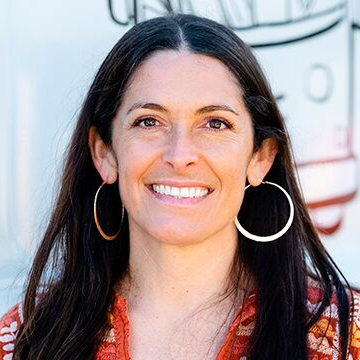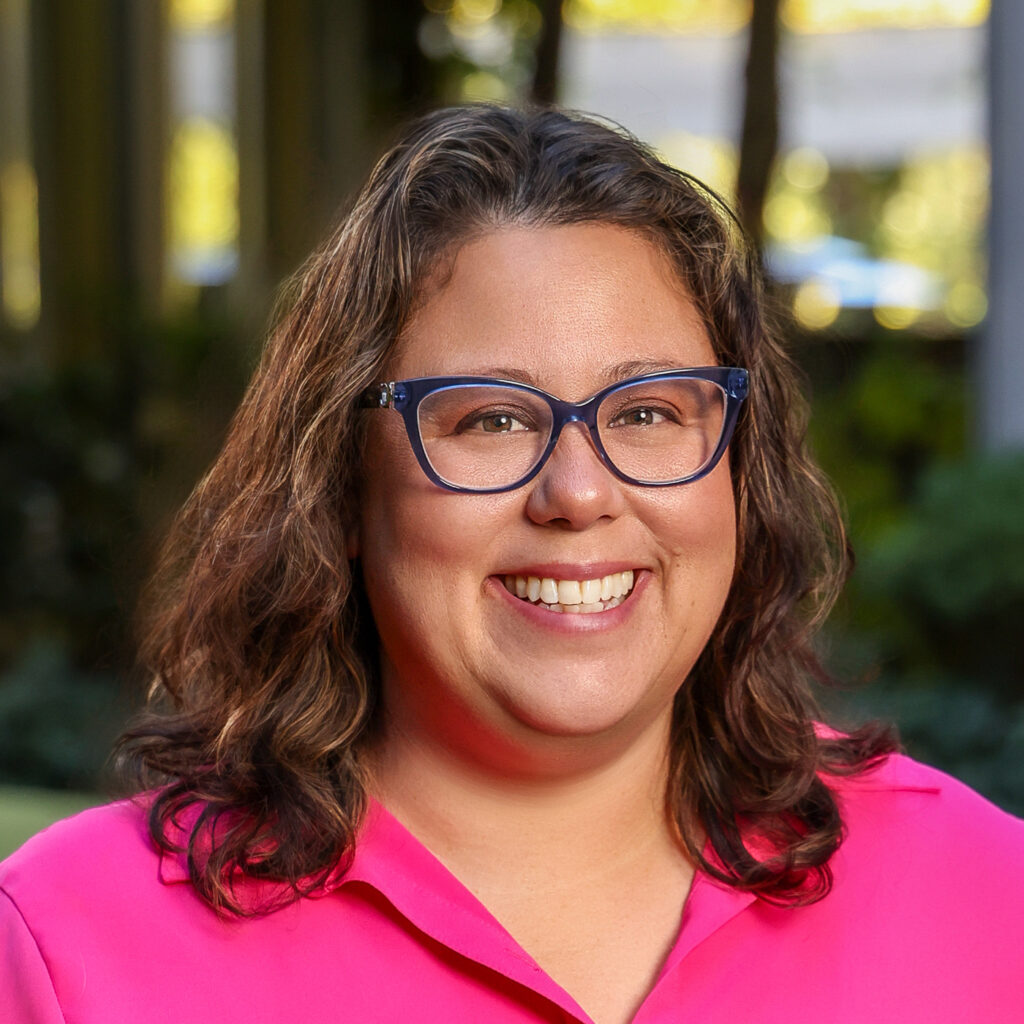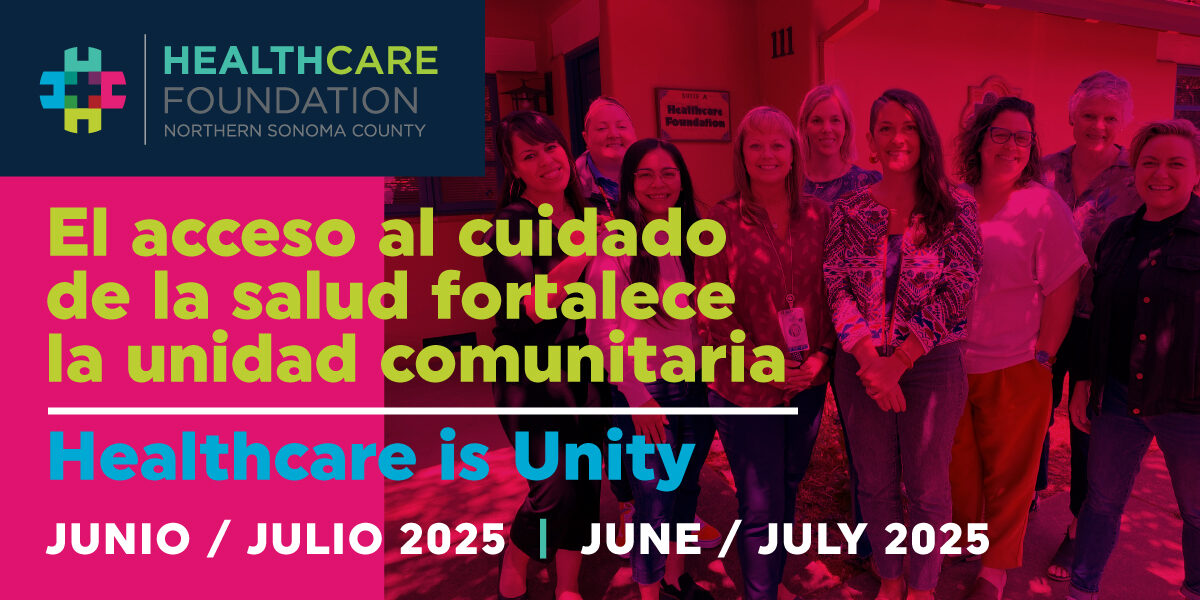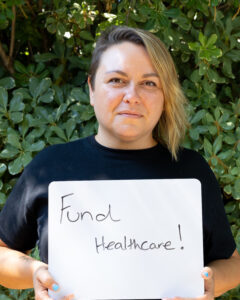

Four Questions for our CalAIM Coalition Partners
1.5 min read per interview. Our partners at Alliance Medical Center, Alexander Valley Healthcare, The Botanical Bus, Corazón Healdsburg, La Familia Sana, and Reach for Home offer their thoughts about the Northern Sonoma County Coalition. Photo, L-to-R: Maria Juarez Sanchez, Erynn Murray and Sue Labbe of Alliance Medical Center; Amy Ramirez of the Healthcare Foundation; and Ana Rangel and Margaret Sluyk of Reach for Home.
The six organizations that make up the Northern Sonoma County Coalition form the backbone of our region’s safety net, collectively addressing a wide range of social determinants of health—from housing and food security to behavioral health and culturally responsive care. As trusted, community-rooted providers, these organizations are central to advancing health equity and ensuring that individuals and families across northern Sonoma County receive the support they need not only to survive, but to thrive.
In an increasingly complex healthcare landscape shaped by initiatives like CalAIM, communication and coordination among service providers are more essential than ever. The Northern Sonoma County Coalition, recently launched by the Healthcare Foundation, seeks to strengthen this interconnected system of care by fostering collaboration, improving shared infrastructure, and amplifying community voice.
To better understand the impact of this new collaborative effort, we invited leaders from each Coalition organization to reflect on their CalAIM progress, the communities they serve, and how being part of this coalition is enhancing their work and mission. What follows are their responses to a set of four questions, which offer insight into their roles, challenges, and collective vision for a healthier, more equitable future in northern Sonoma County.
The leaders we spoke with were:
- Sue Labbe, Alliance Medical Center
- Kirsten Tellez, Alexander Valley Healthcare
- Jocelyn Boreta, The Botanical Bus
- Marcy Flores, Corazón Healdsburg
- Jade Weymouth, La Familia Sana
- Margaret Sluyk, Reach for Home
Click the links above to be taken directly to their interviews.
Susannah Labbe, Chief Executive Officer, Alliance Medical Center

What is the current status of your organization as a CalAIM provider?
Alliance Medical Center is actively participating in CalAIM through our Enhanced Care Management (ECM) services and close coordination with Community Supports providers. As an FQHC [Federally Qualified Health Center], we are proud to serve as a trusted anchor for patients navigating complex health and social needs. While implementation has presented some challenges, particularly in care coordination and data sharing, we remain deeply committed to the promise of CalAIM and its potential to transform care for Medi-Cal patients in our region.
What do you wish people knew about the community you serve?
Northern Sonoma County is home to vibrant, resilient communities with deep agricultural roots, cultural richness, and a strong sense of connection. At the same time, many of our patients face persistent barriers to care, including housing instability, immigration-related fear, mental health needs, and limited access to specialty services. Our community is diverse and multifaceted, including farmworkers, young families, elders, and essential workers whose health and dignity deserve sustained attention and investment.
How is the Healthcare Foundation helping you further your mission?
The Healthcare Foundation has been an essential partner in advancing health equity in our region. Their investments in behavioral health access, bilingual workforce development, and regional collaboration have directly strengthened Alliance Medical Center’s capacity to serve our patients with dignity and compassion. They are more than a funder, they are a true ally, helping to amplify our impact through shared values and visionary leadership.What do you appreciate most about being a part of the Coalition?
Being part of the Northern Sonoma County Coalition has been energizing and deeply affirming. The coalition fosters authentic collaboration across organizations that are grounded in community and committed to equity. It’s a space where trust is built, ideas are exchanged, and shared challenges are tackled collectively. It reminds us that we’re not alone in this work and that, together, we are stronger and more effective.
Kirsten Tellez, Director of Development, Alexander Valley Healthcare

What is the current status of your organization as a CalAIM provider?
Alexander Valley Healthcare (AVH) is a Federally Qualified Health Center (FQHC) that has provided comprehensive primary medical, behavioral health, and dental care to northern Sonoma County since 1994. As the only Medi-Cal–serving provider between Healdsburg and Ukiah, AVH has built a model that is designed to address the barriers to achieving better health outcomes for the rural population we serve.
While the CalAIM initiative officially launched in 2021, AVH did not receive implementation funding until July 2024, through PATH CITED Round 3. These funds have been instrumental in helping us build the infrastructure needed to support the delivery of Enhanced Care Management (ECM) services to our Medi-Cal members.
Since that time, AVH has finalized its ECM contract with Partnership HealthPlan (March 2025), recruited and onboarded dedicated staff, and partnered with Aliados Health for technical assistance and staff training through the PATH TA Marketplace. As of June 2025, we have officially launched ECM services and begun enrolling patients. We are excited to evaluate the impact of ECM on improving care coordination and health outcomes for our highest-need patients.
What do you wish people knew about the community you serve?
Cloverdale and the surrounding community is a vibrant yet deeply underserved region. More than 75% of our 4,000 AVH patients live below 200% of the federal poverty level, and many face significant barriers to accessing consistent, high-quality care. As the only healthcare provider serving this large geographic area, Alexander Valley Healthcare serves a uniquely diverse population — including Medi-Cal, Medicare, and privately insured patients.
“By bringing people and organizations together, the Foundation has played a pivotal role in helping us raise awareness of the challenges our patients face and identify new opportunities for collaboration and impact.”
Kirsten Tellez, Director of Development, Alexander Valley Healthcare
Our community includes seniors aging in place, working families, children and adolescents, migrant and seasonal agricultural workers, veterans, and people experiencing homelessness. Many are navigating complex health and social challenges, often without reliable transportation or stable housing. And like all FQHCs, we are committed to ensuring that no one is ever turned away due to inability to pay.
What makes this community remarkable is its resilience and strong sense of place. Despite the challenges, there is deep local pride, cultural richness, and a shared commitment to building a healthier future for all who live here.
How is the Healthcare Foundation helping you further your mission?
The Healthcare Foundation has been an essential partner — not only through generous, unrestricted financial support, which allows us the flexibility to meet our community’s most pressing needs, but also through their leadership as a convener and connector. They have helped AVH build meaningful relationships with fellow northern Sonoma County community leaders, service organizations, and advocates.
By bringing people and organizations together, the Foundation has played a pivotal role in helping us raise awareness of the challenges our patients face and identify new opportunities for collaboration and impact.
What do you appreciate most about being a part of the Coalition?
Having the support of Coalition members to share ideas and resources, particularly in these current times when all of our service organizations feel that they are under attack. We also appreciate the engagement of the Foundation to help find solutions to shared problems and help us navigate the CalAIM maze.
Jocelyn Boreta, Executive Director, The Botanical Bus

What is the current status of your organization as a CalAIM provider?
Botanical Bus is currently building our capacity, in alignment with the process advised by Aliados Health, to bill for the CHW [Community Health Worker] Benefit in 2026. In Q1-Q2 2025, we worked with a statistician and evaluator to finalize the data framework we will use in the selection and development of a HIPPA-complaint database. In Q3-Q4 2025, while developing the new database, we plan to complete our PAVE [Provider Application and Validation for Enrollment] application and establish contracts with Partnership [HealthPlan] and Aliados as our biller.
What do you wish people knew about the community you serve?
Latine and Indigenous immigrants in Sonoma County experience health disparities deepened by recent federal policy changes. Increased enforcement and public charge concerns have intensified fear and instability, further limiting access to health and mental health services for undocumented and mixed-status families. In 2024, Botanical Bus clients (1,615 individuals who identify as 93% Latine and Indigenous people and 82% Spanish speakers) reported the following barriers to accessing healthcare services: 51% language; 40% trust; and 23% transportation. Botanical Bus overcomes these barriers by providing Spanish-language healthcare programs, led by Latine and Indigenous providers, at worksites and community resource hubs.
In 2024, 72% of Botanical Bus clients reported high levels of physical pain, and 20% experienced mental health challenges that disrupted daily life. This year, we’ve seen a sharp rise in clients citing lack of trust as a barrier to accessing care, alongside increased reports of stress, chronic pain, anxiety, depression, and sleep disturbances. In 2025, PHQ-4 screenings show a growing number of clients experiencing moderate to severe mental health distress, including a concerning rise in suicidal ideation.
“As a small, five-year-old nonprofit founded and governed by the Latine and Indigenous immigrant community we serve, Botanical Bus benefits from the Foundation’s forum for knowledge-sharing, connections, and collaborative funding opportunities with established health and human service providers.”
Jocelyn Boreta, Executive Director, The Botanical Bus
These trends reflect not only the emotional toll of migration and systemic exclusion, but also the urgent need for trauma-informed, culturally centered behavioral health services delivered by trusted providers within the community.
Botanical Bus is uniquely positioned to meet this need through its place-based, culturally centered, collaborative care model and long-standing partnerships with Federally Qualified Health Centers and Family Service Centers serving Latine and Indigenous immigrant communities in Sonoma County. Our services are place-based because residential segregation, by race and ethnicity, income and occupation, determines access to healthcare. Our services are bilingual because 4 in 10 of the 29,000 undocumented immigrants residing in Sonoma County do not speak English. Our services are culturally-centered because positive mental health outcomes that address immigration trauma can be better achieved through valuing cultural wealth. Our services are collaborative because working together across sectors to provide no-barrier access to multidisciplinary care leads to improved health outcomes.
How is the Healthcare Foundation helping you further your mission?
In building our capacity to bill for the CHW Benefit, the Healthcare Foundation supports Botanical Bus in advancing goals of improved community needs assessment and impact measurement. As a small, five-year-old nonprofit founded and governed by the Latine and Indigenous immigrant community we serve, Botanical Bus benefits from the Foundation’s forum for knowledge-sharing, connections, and collaborative funding opportunities with established health and human service providers.
What do you appreciate most about being a part of the Coalition?
Sitting at the table with Coalition members from diverse organizations in shared commitment to sustaining CHW salaries and healthcare services for marginalized community members is health equity in action.
Marcy Flores, Executive Director, Corazón Healdsburg

What is the current status of your organization as a CalAIM provider?
With the support of the Healthcare Foundation, we are actively engaged in the process of becoming a CalAIM provider. Our goal is to align our existing programs with the CalAIM framework to strengthen and sustain the services we currently provide. These include comprehensive case management through our Family Resource Center, as well as culturally responsive outreach, education, and leadership development initiatives led by our Promotoras. Becoming a CalAIM provider would allow us to strengthen and sustain these vital programs that address health and social needs for our community members.
What do you wish people knew about the community you serve?
While northern Sonoma County is often recognized for its affluence and philanthropic potential, there is a profound disparity between that perception and the lived reality of many of the families and individuals we support. Access to essential services such as affordable childcare, housing, mental health support, and intentional youth programming remains a persistent challenge. Our communities continue to experience deep divides rooted in systemic inequities related to income, healthcare, housing, employment, education and transportation. Despite these challenges, our community is rich in cultural knowledge, linguistic diversity, and lived experience — assets we uplift through our programs, leadership development, community empowerment and civic engagement. We are committed to cultivating spaces of belonging where our collective strengths can be fully recognized and utilized for lasting change.
How is the Healthcare Foundation helping you further your mission?
The Healthcare Foundation has been instrumental in helping us advance our mission, not only through direct financial support but by facilitating meaningful partnerships across sectors. These connections strengthen our collective impact, allowing organizations to share knowledge, resources, and best practices. The Foundation’s commitment to collaboration has helped build a more cohesive network of service providers, all working toward the common goal of improving access to care and opportunity for our shared community.
What do you appreciate most about being a part of the Coalition?
What we value most about participating in the Northern Sonoma County Coalition is the authentic collaboration among peers. As nonprofit leaders, having a trusted space for sharing resources, cultivating partnerships, and exploring joint funding opportunities is essential to sustaining our work. The Coalition creates a spirit of mutual support, grounded in humility, compassion, and a shared commitment to equity. Especially during times of heightened social and economic challenges, this collective strengthens not only our impact but also our resilience as leaders dedicated to advancing community well-being.
Jade Weymouth, Executive Director, La Familia Sana

What is the current status of your organization as a CalAIM provider?
La Familia Sana is fully up-and-running as a CalAIM Community Supports provider, focusing on housing navigation and tenancy-sustaining services. Our team is made up of Community Health Workers who are deeply connected to the people we serve — many have lived the same experiences. We’re walking alongside individuals and families, helping them stay housed, access care, and navigate systems that often weren’t built for them. We’re still growing, still learning, but our impact is real and growing every day. We have more work to do and learning to be had, but overall I am excited about the direction that we are headed to best serve our community.
What do you wish people knew about the community you serve?
That our community is full of strength, love, and quiet power. People often focus on the challenges — poverty, housing instability, immigration status — but miss the joy, the culture, and the resilience that exists in every family we serve. These are folks holding up entire industries while also raising kids, caring for elders, and trying to survive systems that weren’t designed with them in mind. They deserve more than charity — they deserve investment, equity, and recognition. Work that supports this vision is work we want to be part of.
How is the Healthcare Foundation helping you further your mission?
The Healthcare Foundation has been more than a funder — they’ve been a true partner. They believed in us when we were still building the plane mid-flight, and they continue to support our growth in meaningful ways. Their funding helps us sustain our team, deepen our impact, and keep Community Health Workers at the center of our work. And they’ve opened doors — connecting us to other leaders, advocating for us during the toughest times, and thoughtfully partnering to bring in resources to spaces where our community’s voice needs to be heard. Amy and her team have committed to digging in and doing the work in Cloverdale alongside us!
What do you appreciate most about being a part of the Coalition?
I love that we’re not doing this work in isolation. Being part of the Coalition means we get to learn from each other, problem-solve together, and stay aligned on the bigger picture. It reminds me that even when things feel heavy, we’re not alone in this — we’re part of something bigger. The collaboration feels honest, supportive, and rooted in real relationships, and that’s rare. It gives me hope.
Margaret Sluyk, Chief Executive Officer, Reach for Home

What is the current status of your organization as a CalAIM provider?
We are contracted for CalAIM Community Supports to provide housing tenancy and housing navigation services. We started invoicing for our contract in March by working with Aliados.
What do you wish people knew about the community you serve?
Reach for Home serves the unsheltered and precariously housed individuals and families. The majority of people we serve are lifelong members of northern Sonoma County. Over 80% of the unsheltered members of the community have been experiencing homelessness for over 5 years and have a physical or mental disability.
How is the Healthcare Foundation helping you further your mission?
The Healthcare Foundation has been a huge advocate in connecting Reach for Home to Aliados [Health], an organization that helps invoice and report for CalAIM funding. Reach for Home needed this assistance in order to understand the complicated billing and reporting requirements of this funding source. In addition, the Healthcare Foundation provided funding to help. Through this effort, the Healthcare Foundation also pulled together all of the social service providers in northern Sonoma County so we can begin working even more closely together to assist those who need it most in our community.
What do you appreciate most about being a part of the Coalition?
We are enjoying being part of a collective solution for northern Sonoma County. We can make a great impact together!
We gratefully acknowledge the following individuals and funders who have supported this effort:
Community Foundation Sonoma County
Barbara Grasseschi and Tony Crabb
Medtronic
North Sonoma County Health District

Related News + Stories
Invest in Our Community
Your support is vital to our collective vision of eliminating health inequities in northern Sonoma County.
Donate



